Organic foods
 ©Janet Allen
©Janet Allen Our organic garden
We love knowing the fruits and vegetables we grow in our own garden are free of pesticides.
We not only avoid ingesting toxic chemicals (many of which have never been fully tested, nor have their interactions), but we're convinced that foods grown in truly organic soil (not merely pesticide-free food) are healthier because the soil in which they're grown is healthier than is the soil that remains after industrial agriculture gets through with it.
Periodically headlines shout that some study or other has found that organic produce is no healthier than non-organic. But what kind of "organic" are they comparing to "conventional" food? Industrial organic food that is merely free of pesticides or foods produced by methods Eliot Coleman calls "deep organic," (see sidebar) in which the grower enriches and preserves the soil? That's the comparison I'd like to see studied!
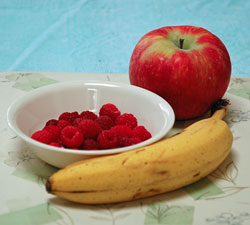 ©Janet Allen
©Janet Allen Organic fruit
We can't grow everything we eat, so we try to find as many other organic foods as possible. We were especially happy to find a local orchard that is growing organic apples.
We buy organic bananas, too, even though they aren't on the list of produce with the most pesticide risk. Of course, this is because people peel bananas, so the edible part is less likely to have pesticides. BUT this means only that it's less of a health risk for us. It means nothing in terms of the banana plantation workers' exposure to the many pesticides used, to the Central American land that is being polluted or the exposure of Central American wildlife to these poisons. To us, it seems like a pretty good investment of at most about 20¢ a pound extra. Unfortunately, there are additional issues associated with this fruit.
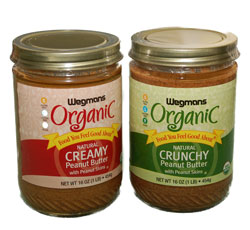 ©Janet Allen
©Janet Allen Our favorite organic peanut butter
We buy other organic foods as often as we can. Some examples are coffee, tea, and chocolate, as well as beans, crackers, flour, and so on.
Some organic items we do NOT buy are processed foods that may well be "organic" in the sense that they are made from ingredients that weren't sprayed with pesticides, but which are not really foods we'd want to eat. Some examples are organic potato chips, organic granola bars etc. etc. Making a potato chip organic doesn't make it healthy.
Organic only for the wealthy?
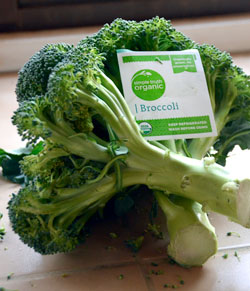 ©Janet Allen
©Janet Allen Organic broccoli - a bit more expensive than "conventional" broccoli
It's true that organic food is generally more expensive than conventionally-grown food. Does that mean it's only for the wealthy?
If we were struggling to put any food at all on the table, then organic wouldn't be my top priority. Of course. People must make choices based on their own financial circumstances.
But as a society, we need to consider what kind of agriculture we're subsidizing (and we're heavily subsidizing industrial agriculture, not local farmers growing organic produce).
Although there's not much an individual can do to change their own income or the price of organic food, we can vote for people who put the health of our citizens and the health of our soil and agricultural systems above the lobbyists for industrial agriculture.
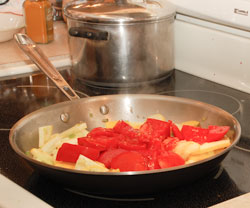 ©Janet Allen
©Janet Allen The beginnings of a simple organic stir fry, using ingredients from our garden
We sympathize with low-income people who would like to buy organic, but simply can't afford it. But it's likely that many more people than do could support this healthier choice by shifting their food dollars away from purchasing excessive amounts of meat, restaurant meals, convenience foods (not to mention luxuries such as 500-channel cable TV etc.) toward simply cooking their own meals with wholesome organic ingredients and possibly even growing some of their own food.
It's hard to prove, I guess, but when you look at the cost of health care when you get sick, staying healthy by eating whole food begins to look like a bargain!
Can organic feed the world?
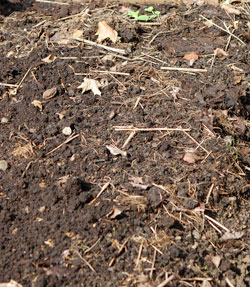 ©Janet Allen
©Janet Allen Some of our dark, rich organic soil
Some people have suggested that organic methods can't feed the world. It all depends on what your mean by organic. If you mean crops grown merely without chemical pesticides, then they may be right since industrial agriculture minus pesticides doesn't nurture the soil.
However if you mean what Eliot Coleman refers to as "deep organic," in which a whole range of organic practices are used with the goal of nurturing the soil, increasing evidence shows that these deep organic methods are superior. This is how we garden organically, and we have a bounty of fruits and vegetables—and very good soil.
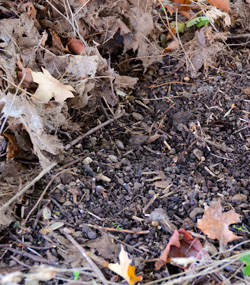 ©Janet Allen
©Janet Allen Soil in the rest of our yard
We nurture the soil in the rest of our yard, too, by leaving leaves to decompose and by using other earth-friendly techniques.
The whole question is irrelevant anyway, since our current fossil-fuel-based agricultural system won't survive the downside of peak oil, and it won't survive the eventual loss of our topsoil, which is depleted by industrial agriculture.
